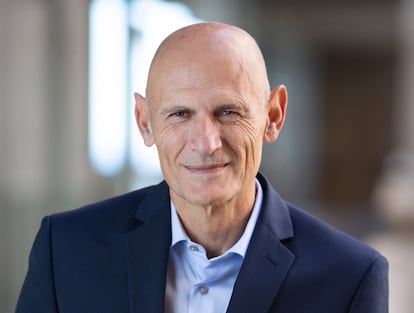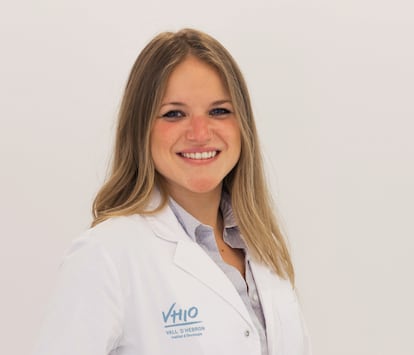Juan Carlos Izpisua: ‘Within two decades, we will be able to prevent diseases and aging’
The leading Spanish scientist talks to EL PAÍS about his new role at the secretive multinational Altos Labs, where he hopes to use cellular rejuvenation to reverse illness and cell deterioration

In the past few months, a new US company, with a staggering initial budget of €2.7 billion ($2.94 billion), has been secretly signing up some of the best scientists in the world, including four Nobel laureates. When Altos Labs finally launched on January 19, it declared its goal was to enable humans to live longer, healthier lives. It did not reveal who is funding the project, but some reports – neither confirmed nor denied – suggest that a large part of the money is coming from the richest man in the world, Amazon founder Jeff Bezos. The British newspaper The Times led with the headline: “Jeff Bezos recruits in quest for eternal youth.”
Spanish scientist Juan Carlos Izpisua is one of the high-profile names to be hired by Altos Labs. The 61-year-old researcher, who was born in the Spanish town of Hellín in the northern Castilla-La Mancha region, denies that the project is just the whim of a billionaire who wants to be immortal. “That is simply not true. Our interest is in advancing in this area of knowledge and opening the field as wide as possible, so that, over time, everyone can benefit,” he tells EL PAÍS. The company will establish three institutes: one in the US city of San Diego, which will be led by Izpisua, one in Cambridge in the United Kingdom, and another in San Francisco.
The multinational is enveloped in secrecy. This newspaper requested to speak with four of the Spanish scientists recruited by Altos, but the company only approved an interview with Izpisua, who responded to EL PAÍS’ questions by email. “The idea behind our investigations is not so that human beings live 100 or 1,000 years more. If we are able to prolong life without improving the quality of these years, not only would it be morally questionable, but also I would question what purpose it would serve,” says Izpisua. “Our main goal is to enable people to have a healthier life for a longer period of time and to reverse illness in patients of all ages.”
In addition to Izpisua, the leadership team of Altos includes four Nobel laureates: chemist Jennifer Doudna, (2020 Nobel Prize for chemistry), engineer Frances Arnold (2018 Nobel Prize for chemistry), virologist David Baltimore (1975 Nobel Prize for medicine) and Shinya Yamanaka (2012 Nobel Prize for medicine).
For the first few days, the young cells of a tiny human embryo are able to turn into any kind of tissue, but they quickly start to specialize in order to create the different organs of the body. Japanese scientist Yamanaka discovered that this process could be reversed. In 2006, he invented a technique to revert adult cells to their embryonic state. His work revealed that cells can be rejuvenated in the laboratory, largely thanks to the activation of four genes that are responsible for the production of four reprogramming molecules, which are known as Yamanaka factors.
This cellular reprogramming will be one of the main lines of investigation at Altos. The company has also hired Spanish scientists Manuel Serrano and María Abad, who in 2013 applied Yamanaka’s technique in animals for the first time. The researchers were able to revert adult cells in living mice into embryonic stem cells, opening the door for the regeneration of damaged organs. The problem of their pioneering work, however, was that the mice developed multiple tumors.

Izpisua’s team at the Salt Institute in the US was able to avoid this problem in 2016, by activating the four rejuvenating genes intermittently, instead of constant programming. In this case, the mice lived 30% longer, even though they had been genetically modified to age prematurely in order to speed up the experiment. On Monday, Izpisua presented the latest results of the study in the specialist journal Nature Aging. His research team and other scientists from the biotech company Genentech intermittently activated the four genes in middle-aged healthy mice for a period equivalent to 35 human years. This partial reprogramming led “to rejuvenating effects in different tissues, such as the kidney and skin,” according to the study. Similar findings were made by Manuel Serrano’s team at Barcelona’s Institution of Biomedicine Research, and published in the journal Aging Cell.
Our end goal is to find new forms of helping everyone to slow or even reverse the processes that lead to diseaseSpanish scientist Juan Carlos Izpisua
“We can program and rejuvenate the tissues and organs of animals with different pathologies, as well as rejuvenate their cells,” explains Izpisua. “Conceptually, I find no reason that stops us from thinking that similar results cannot be achieved in humans, both with respect to improving the course of many diseases and with the rise in the length and quality of life. Indeed, we have already demonstrated this with in vitro human cells.”
For Izpisua’s latest study in Nature Aging, his research team came up with an ingenious experiment. The mice are genetically modified to have additional copies of the four rejuvenating genes, which are only activated if the animal drinks water with the antibiotic doxycycline. This drug acts as an interrupter to either increase or reduce the Yamanaka factors. It’s impossible to carry out the same experiment on humans, but Izpisua is planning similar research on monkeys. In this case, his team will try to rejuvenate the animals by partially programming the Yamanaka factors with RNA messenger technology, popularly known for its use in the Pfizer-BioNTech and Moderna Covid-19 vaccines, or with chemical compounds.
Izpisua, who created 132 human-monkey embryos in a controversial experiment in China, says the main goal of the upcoming monkey study is to certify whether the rejuvenating treatment is safe in the long term and to understand what molecular changes are produced. For the scientist, it’s important to understand illness “as a process of cell deterioration that is reversible.” Izpisua also points out that low-calorie diets have a positive impact on health, and that it may be possible to develop medicines that “mimic the beneficial effect of calorie restriction.”
Izpisua is optimistic this research will yield results. “I am convinced that within two decades we will have tools that not only treat symptoms, but also can predict, prevent and treat diseases and aging through cellular rejuvenation.” He concludes: “Our end goal is to find new forms of helping everyone to slow or even reverse the processes that lead to disease.”
Tu suscripción se está usando en otro dispositivo
¿Quieres añadir otro usuario a tu suscripción?
Si continúas leyendo en este dispositivo, no se podrá leer en el otro.
FlechaTu suscripción se está usando en otro dispositivo y solo puedes acceder a EL PAÍS desde un dispositivo a la vez.
Si quieres compartir tu cuenta, cambia tu suscripción a la modalidad Premium, así podrás añadir otro usuario. Cada uno accederá con su propia cuenta de email, lo que os permitirá personalizar vuestra experiencia en EL PAÍS.
¿Tienes una suscripción de empresa? Accede aquí para contratar más cuentas.
En el caso de no saber quién está usando tu cuenta, te recomendamos cambiar tu contraseña aquí.
Si decides continuar compartiendo tu cuenta, este mensaje se mostrará en tu dispositivo y en el de la otra persona que está usando tu cuenta de forma indefinida, afectando a tu experiencia de lectura. Puedes consultar aquí los términos y condiciones de la suscripción digital.









































